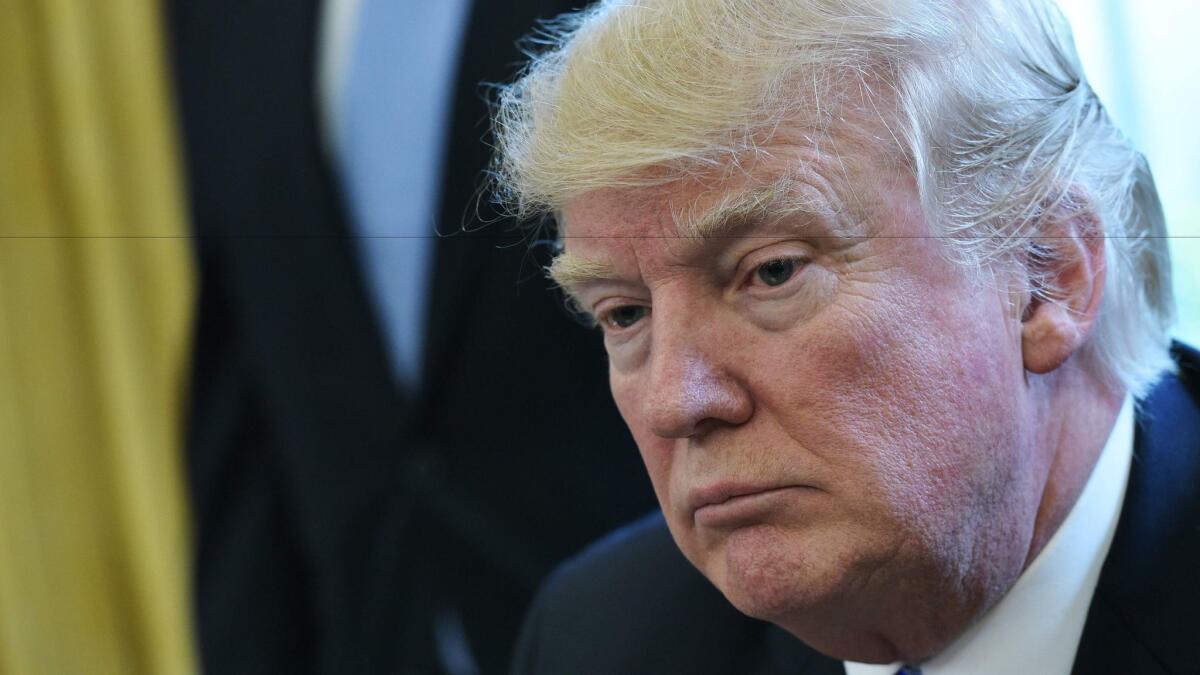Column: It turns out Donald Trump is not an Artist of the Deal

- Share via
“Winning is everything,” Donald Trump often said as he campaigned for president. “Nothing is presidential except victory.”
This week, Trump suffered a major defeat when he couldn’t force a House vote for the healthcare bill he endorsed. But Trump being Trump, he said it wasn’t really a defeat; it was a success in disguise.
“Here’s the good news,” he told the Washington Post. “Healthcare is now totally the property of the Democrats…. I’ve been saying for years that the best thing is to let Obamacare explode and then go make a deal.”
That’s not how the presidency is supposed to work, of course. Voters aren’t likely to blame Democrats for the fact that Republicans couldn’t get their act together. Nor should they. Besides, only a month ago, Trump renewed his pledge to replace Obamacare “immediately” — with “something great.” His failure isn’t just a broken promise; it means he’s abandoning, at least temporarily, one of his party’s central goals.
The way Trump’s effort failed raises a larger question with consequences for the rest of his agenda: Does the president understand his own job description?
The way Trump’s effort failed raises a larger question with consequences for the rest of his agenda: Does the president understand his own job description? Although he’s gloried in the showy, imperial parts of the presidency — speaking at rallies, signing executive orders — a big part of any president’s job consists of steering his agenda through Congress. And many of Trump’s priorities, including tax reform, will require legislation. That means persuading members of Congress to vote yes, a task that should be easier when the president’s party controls both houses.
But on his first time out, it didn’t work. The great marketer wasn’t very persuasive — even among his putative allies.
What went wrong?
First, Trump never bothered to learn the details of the bill he was trying to sell. “Nobody knew healthcare could be so complicated,” he declared last month.
Second, Trump signaled repeatedly that that his heart wasn’t in the effort — that he’d be just as happy, maybe happier, if the bill didn’t pass. His aides insisted that it not be called “Trumpcare”; they preferred “Ryancare,” implicitly assigning blame to the Speaker of the House. What congressman would be eager to vote for a flawed bill if the president wasn’t fully committed?
Third, Trump never sold the bill to the public. His spokesman claimed last week that he “left everything on the field,” but that didn’t include something as simple as giving a speech to the nation. Polls showed the bill winning the support of as few as 17% of voters, another reason for members of Congress to flee.
Fourth, he couldn’t strong-arm wavering lawmakers.
Trump’s main argument was that anyone who voted against the bill would suffer when they ran for reelection. But the members of Congress, most of whom have run more times than the president, didn’t believe him.
One reason is that the lawmakers most opposed to the bill, the far-right Freedom Caucus, don’t need Trump to raise money for their campaigns. Powerful conservative organizations, including the constellation of groups around Charles and David Koch, promised millions of dollars to underwrite them if they voted no.
Meanwhile, moderate Republicans from the northeast deserted the president for a simpler reason: they fear their voters more than they fear him. Trump isn’t very popular right now, especially in the New York and California districts many of those moderates are clinging to.
Power is cumulative; it rests on what the late presidential scholar Richard E. Neustadt called “reputation.”
“The greatest danger to a president’s influence,” he wrote, is whether other politicians expect him to succeed or fail. “If his failures seem to form a pattern, the consequence is bound to be a loss of faith in his effectiveness next time.”
That’s why Trump has even more on the line in his next battle, over tax reform — an issue, he’ll find, that’s every bit as complicated as healthcare.
I’m going to make a wild guess here and bet that Trump never read Neustadt’s “Presidential Power.” Aides have said that he’s not much of a reader. He is, however, listed as the author of 18 books, and he may find some useful lessons in those works. In “The Art of the Deal,” for example, he weighs the pros and cons of punishing his enemies.
“When people treat me badly … my general attitude, all my life, has been to fight back very hard. The risk is you’ll make a bad situation worse.”
Or he could simply ask for a briefing on how his predecessors have coped with setbacks.
Both Jimmy Carter and Bill Clinton had rough first years. Both had a hard time persuading their own party to enact their agendas, including healthcare bills. Both saw their standing sag in the polls.
But their presidencies had different outcomes. Carter never quite mastered the art of congressional persuasion; his tenure ended after a single term. Clinton did better, with bipartisan deal-making (on welfare reform) and brinkmanship (on the budget).
Trump hasn’t tried either of those techniques yet. Is he willing to learn from his mistakes?
Follow the Opinion section on Twitter @latimesopinion or Facebook.
Twitter: @DoyleMcManus
MORE FROM OPINION
Trump discovers that legislating is complicated as the GOP healthcare bill goes down in flames
Keystone Pipeline and other Trump energy policies could help swamp Mar-a-Lago
It’s not Neil Gorsuch’s fault, but we can’t support his ascension to a stolen Supreme Court seat
More to Read
A cure for the common opinion
Get thought-provoking perspectives with our weekly newsletter.
You may occasionally receive promotional content from the Los Angeles Times.











